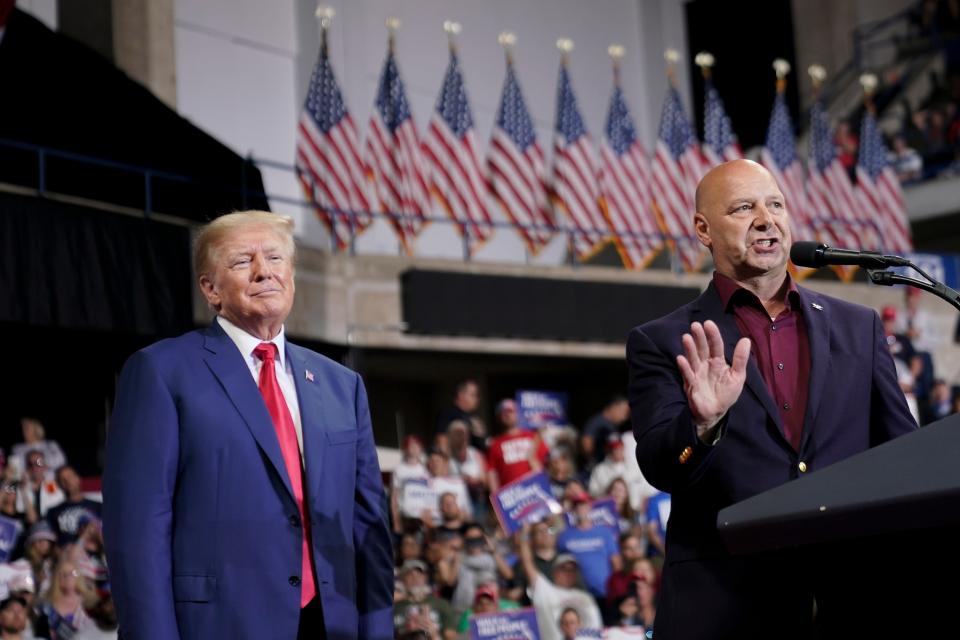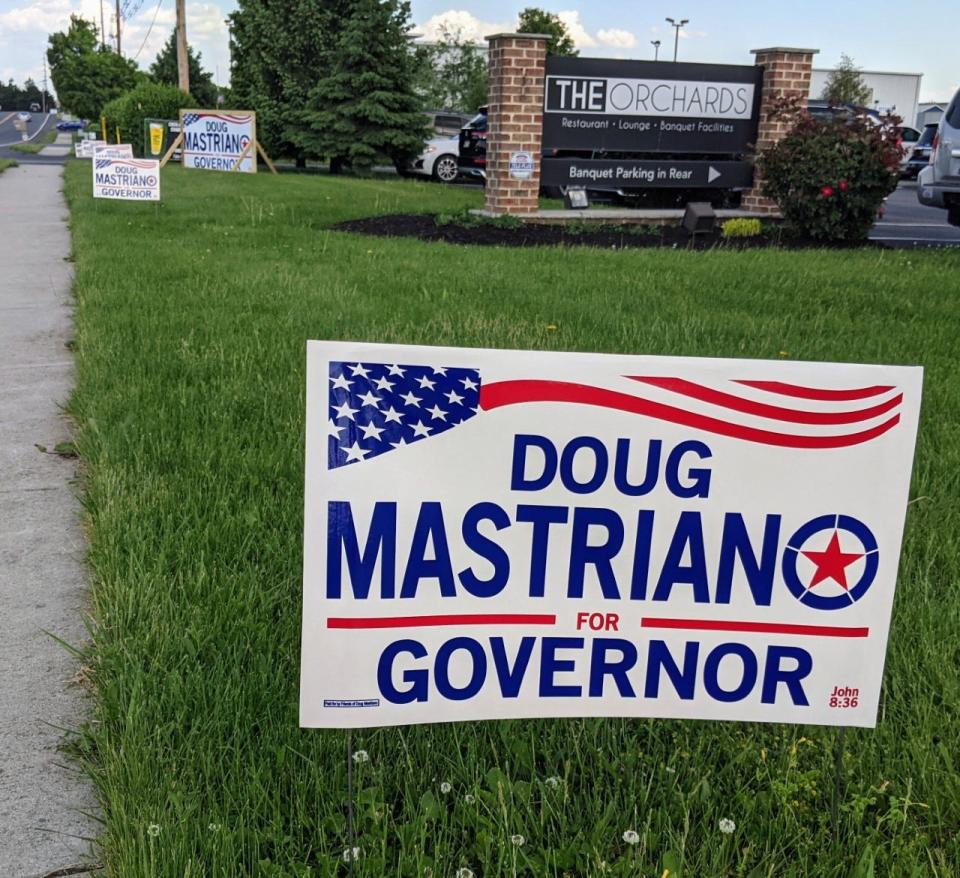Our View: Doug Mastriano's dangerous history of election denial and contemptuous disdain for system
- Oops!Something went wrong.Please try again later.
- Oops!Something went wrong.Please try again later.
What leads voters to believe Doug Mastriano will accept a result he doesn't like in the coming gubernatorial election?
Don't tell us it's not a fair question, or that it doesn't need to be asked.
Not after Donald Trump, the leader of Mastriano's Republican party, stood up in the wee hours of Nov. 4, 2020 and told the world that he and his supporters were victims of "a major fraud in our nation" and the election was "an embarrassment to our country," carried out by "a very sad group of people."
Not after Mastriano, time and again, publicly and behind the scenes, took that narrative and ran with it, advancing the lie that it was Trump, and not Joe Biden, who'd actually won the election based on "evidence" so flimsy and speculative that, out of 62 lawsuits Trump and his allies filed after the election, 61 failed. That one win, in Pennsylvania, affected few votes and didn't change the outcome in the Keystone State.
Not after Dec. 12, 2020, the date of an email from a former One America News Network on-air personality linking Mastriano to a failed scheme to assemble lists of Trump-supporting fake electors in battleground states. The emails were obtained by the New York Times. Mastriano has denied involvement.
Not after Dec. 21, 2020, when Mastriano went on the Patriots' Soapbox Network's "The Common Sense Show," which frequently traffics QAnon conspiracy theories, and said "There was massive fraud in Pennsylvania and it needs to be satisfied. And millions of people across the state have been defrauded. I think in the end, assuming truth prevails, (Trump) will have a second term."
Not after Dec. 28, 2020, when Mastriano wrote a letter that included debunked voter fraud claims in Pennsylvania and sent it to acting deputy attorney general Richard Donoghue. In it, he asked why "the very state where the light of liberty was lit in 1776 is unable or unwilling to have elections as free and safe as war-torn Afghanistan?"

And certainly not after Jan. 6, 2021, when he became the poster boy for election denialism in Pennsylvania by chartering buses to the "Stop the Steal" rally that preceded an attack on the U.S. Capitol by Trump supporters. Mastriano, himself, marched to the Capitol and demonstrated outside, later saying at no point did he "go beyond police lines." When video footage later showed that he did indeed pass through breached barricades, he released a statement saying, in part, that "even disingenuous internet sleuths know that police lines did shift throughout the course of the day. I followed those lines as they existed."
It seems more than reasonable to ask Mastriano why the commonwealth's voters should trust the man arguably best-known for denying the legitimacy of a Pennsylvania election to accept the legitimacy of a Pennsylvania election when he himself stands at the top of the ticket with his political career on the line.
He has been silent on the question and his running mate Carrie Lewis DelRosso declined to directly answer it during an interview with an ABC affiliate this month. Instead, the candidate to serve as Mastriano's lieutenant governor uttered words that easily could have come from Trump himself: "We're not going to lose. I'm a winner."
Absent an answer from Mastriano, we have no choice but to turn to what he has done and promised to do regarding the administration of Pennsylvania's elections for clues as to his intent.
In April 2021, Mastriano introduced Senate Bill 573, his so-called "Poll Watcher Empowerment Act" to allow any poll watcher in Pennsylvania to serve in any precinct in the commonwealth. That means partisan poll watchers from, say, Philadelphia could work the polls in the Poconos, or volunteers from, say, Franklin County could report for duty in Bucks County. It also would have afforded those poll watchers with extra protection from election officials who might try to impede the partisans' activities.
To us, this sounds like a bill that'd sow chaos, and perhaps even violence, at the polls. Frighteningly, it passed both Republican-controlled houses and landed on the governor's desk. Thankfully, Gov. Tom Wolf had the good sense to veto it, correctly noting in his July 8, 2022 veto message that it "undermines the integrity of our election process and encourages voter intimidation."

"This bill makes it possible for bad faith partisan operatives to target a specific neighborhood or group of voters in an attempt to challenge the eligibility of voters, make poll workers' jobs more difficult and disrupt the counting of ballots," Wolf said.
In August 2021, Mastriano introduced Senate Bill 819, calling for "Creation of the Pennsylvania Elections Commission." It'd replace the Department of State's Bureau of Commissions, Elections and Legislation with three commissioners hand-picked by the governor, the PA House speaker (currently Rep. Bryan Cutler, R-100) and the President Pro Tempore of the PA Senate (currently Sen. Jake Corman, R-34) to lead oversight of statewide elections.
Regardless of who resides in the Governor's Mansion, such a measure would essentially put Republicans in charge of overseeing elections in Pennsylvania for as long as the GOP controls both houses. Democrats haven't led the Pennsylvania Senate since 1993. Democrats have only controlled the House in four of the last 28 years.
Mastriano's campaign website — www.doug4gov.com — says that, as governor, he will "partner with the legislature to eliminate 'no-excuse' mail-in voting, get rid of drop boxes and pass universal voter ID."
He also said during a debate ahead of the primary that he'd require voters to "re-register," suggesting he could try to decertify Pennsylvania's 8.7 million registered voters and ask them all to register to vote all over again, a move that's widely seen as an attempt to disenfranchise Pennsylvanians of limited means as well as those who are members of minority communities — groups that tend to vote for Democrats.
Taken as a whole, we worry that Mastriano's words and actions paint him as someone with a contemptuous disdain for the system that's poised to determine whether or not he'll be Pennsylvania's next governor. And his persistent and rigorous denial of the 2020 presidential election results show he's nothing if not willing to follow Trump's playbook in the wake of an election defeat.
Mastriano's ability to mount a Trumpian election denial campaign in Pennsylvania hinges on financial and philosophical buy-in from his supporters.
To them, we say this: If you can't picture Mastriano making a concession speech to Democrat Josh Shapiro, you should think twice before continuing to enable him.
This article originally appeared on The Intelligencer: Doug Mastriano's dangerous history of election denial

